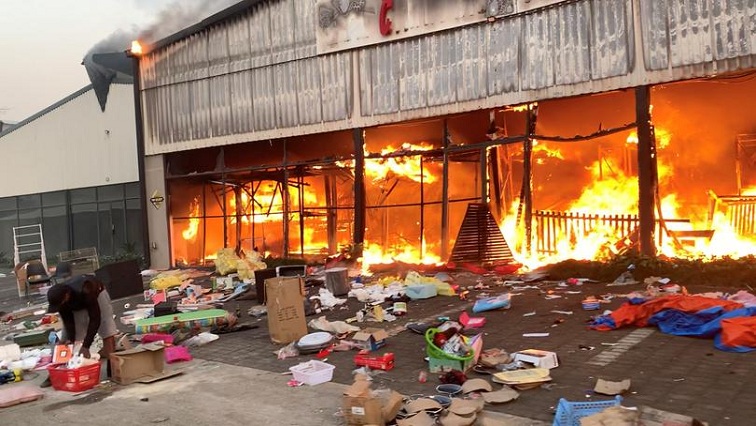The South African Human Rights Commission (SAHRC) says the final report into the July 2021 unrest in KwaZulu-Natal (KZN) and Gauteng is expected to be released on July 24 this year.
The HRC was responding to questions in Parliament’s Justice and Correctional Services Committee when it presented the commission’s annual performance plan and budget.
Some members of the Justice Committee raised concern over the slow progress by the commission in completing reports on investigations they have undertaken.
The unrest was marred by violence, looting and destruction of property that gripped the two provinces almost two years ago.
VIDEO: Aerial view of looting in KwaZulu-Natal
More than three hundred people died.
Human Rights Commissioner Andre Gaum says they are facing a challenge of not enough report writers.
He says one report writer also left recently.
Gaum says the panel has given specific timelines with the provisional report into the unrest expected to be ready towards the end of this May.
“We have two of them working on the unrest report before it comes to commissioners. We have insisted as the panel that consist of myself, Commissioner (Philile) Ntuli and Commissioner (Chris) Nissen that a timeline is presented to us and we have raised a specific timeline in this regard. And I can report in that regard for example, the submission of the provisional unrest report to external stakeholders will take place on the 29th of May this year. We then will provide the stakeholders and respondents in the matter the 30 days, which is a shortened period. Normally we would allow 60 days and then we plan according to our timeline, that we are monitoring very closely, that the launch of the final unrest report will happen on the 24th of July this year.”
The commission says it is now putting various measures in place to expedite the completion of reports when complaints are laid.
“We are putting steps in place; we are also reviewing our complaints handling procedures thinking of new innovative ways of getting reports quicker. For example, having sitting hearings on certain focus areas in provinces, depending on the pertinent issues in that province. And then referring matters to the sitting hearings. For example, you can have a sitting hearing on education and you don’t have to re-establish a hearing every time complaints comes up. And secondly to also allow provinces to do certain hearings which are not high-profile kind of hearings, systemic matters and so on”, Gaum added.
VIDEO: Continued impact of July 2021 unrest
Staff retention
Meanwhile, the commission has also told the Committee that it’s battling to retain critical staff.
Human Rights Commission Chairperson Professor Bongani Majola says lack of salary increases is one of the reasons why the commission is unable to retain employees.
Majola says the commission has been losing senior managers who left for better opportunities,
“We had for example three provincial managers or two provincial managers who have decided to go into private practice because of the glass ceiling in the commission. We couldn’t increase salaries for staff quite a long time because of the limited resources that we have had. And we lost that. Then we asked that we should be given a monthly report and the monthly report on departures indicated sometimes that the staff were not willing to say why they were leaving, but instances they simply say that we got better opportunities elsewhere.”
Load shedding impact
During the briefing the commission also raised concern about the impact of load shedding on the purification and transportation of water, when it responded to questions from MPs.
Human Rights Commissioner Philile Ntuli says the commission is in support of alternative energy sources.
Ntuli says the rolling blackouts also have an impact on socio-economic rights enjoyed by citizens as provided for in the bill of rights.
“It’s not just water. It’s the package of human rights. In particular socio-economic rights to adequate food, housing and education, health social security. In our research we agreed that six percent of South Africa’s total energy consumption is dedicated to water purification as well as water transportation, particularly bulk water infrastructure. And therefore, when there is no electricity, we have problems with pumping water into the necessary reservoirs.”
Ntuli adds, “And there is also the double-edged impact of the sewage, so it’s not just access to water, but there is also issues of sewage. We have seen particularly in KZN, not just as a result of load shedding but also the impact of crises like load shedding and the July unrest and the infrastructure and the impact there in also on natural resources such as our oceans. And these of course have a related impact on health and we are then experiencing a serious health crisis as a result of the interrelated impact of load shedding on water, health and other socio-economic rights. We are therefore as a commission in support of alternative energy sources, particularly the ongoing debate in these questions around the just transition as means to alternative power sources.”

